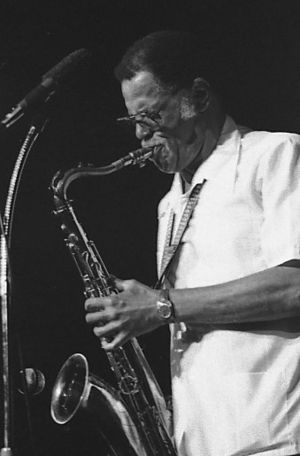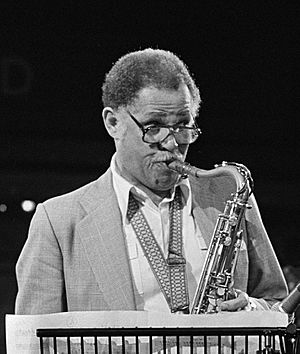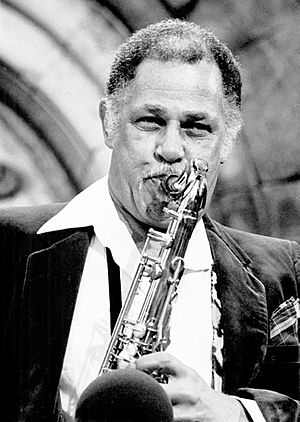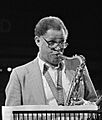Dexter Gordon facts for kids
Quick facts for kids
Dexter Gordon
|
|
|---|---|

In concert in Toronto, August 19, 1978
|
|
| Background information | |
| Also known as | Long Tall Dexter |
| Born | February 27, 1923 Los Angeles, California, U.S. |
| Died | April 25, 1990 (aged 67) Philadelphia, Pennsylvania, U.S. |
| Genres | Jazz, swing, bebop, hard bop |
| Occupation(s) | Musician, composer, bandleader |
| Instruments | Tenor saxophone, soprano saxophone |
| Years active | 1940–1986 |
| Labels | Blue Note, Savoy, Columbia |
| Associated acts | Gene Ammons, Billy Eckstine, Dizzy Gillespie, Wardell Gray, Lionel Hampton |
Dexter Gordon (February 27, 1923 – April 25, 1990) was an American jazz tenor saxophonist, composer, bandleader, and actor. He was one of the most important early bebop musicians. Other famous bebop artists included Charlie Parker, Dizzy Gillespie, and Bud Powell.
Gordon was very tall, about 6 feet 6 inches (198 cm). Because of his height, people called him "Long Tall Dexter" and "Sophisticated Giant". He played music and performed for over 40 years.
Dexter Gordon's saxophone sound was often described as "big" and open. He liked to play his notes a little behind the main beat. He was also known for adding short musical parts from other songs into his solos. These could be anything from "Happy Birthday" to famous opera tunes. This was a special part of his unique style.
One of his biggest influences was the jazz saxophonist Lester Young. In turn, Dexter Gordon inspired other great musicians like John Coltrane and Sonny Rollins. Later, as Gordon explored new jazz styles in the 1960s, Rollins and Coltrane also influenced his playing.
Gordon was known for being friendly and funny on stage. He believed in connecting with his audience through his music. His improvisations were smart and fun to listen to. They were like a delightful and interesting conversation. He sometimes even recited lyrics from a song before playing it.
Dexter Gordon was nominated for an Academy Award for Best Actor for his role in the film Round Midnight (1986). He also won a Grammy Award for Best Jazz Instrumental Performance for the movie's soundtrack album. In 2018, his album Go! (1962) was chosen by the Library of Congress. It was added to the National Recording Registry because it was "culturally, historically, or aesthetically significant."
Contents
Life and Music Career
Early Life and Family Background
Dexter Keith Gordon was born on February 27, 1923, in Los Angeles, California. His father, Dr. Frank Gordon, was one of the first African American doctors in Los Angeles. He had famous patients like Duke Ellington and Lionel Hampton.
Dexter's mother, Gwendolyn Baker, had an interesting family history too. Her father, Captain Edward Lee Baker, Jr., was a hero. He was one of only five African American soldiers to receive the Medal of Honor during the Spanish–American War.
Gordon started learning music when he was 13 years old, playing the clarinet. At 15, he switched to the alto saxophone, and then to the tenor saxophone at 17. He studied music at Thomas Jefferson High School. While still in school, he played in bands with future jazz stars like Chico Hamilton.
From 1940 to 1943, Gordon played in Lionel Hampton's band. He was in the saxophone section with other talented musicians. After that, he played with the Fletcher Henderson band and the Louis Armstrong band. Then, he joined Billy Eckstine's band.
Becoming a Bebop Star
By late 1944, Dexter Gordon was living in New York. He often joined jam sessions where musicians played bebop jazz. He became a featured soloist in Billy Eckstine's big band.
In early 1945, he recorded with Dizzy Gillespie and Sir Charles Thompson. Later that year, he started recording his own music for the Savoy label. His Savoy recordings included famous songs like Blow Mr. Dexter and Long Tall Dexter.
In 1946, he moved back to Los Angeles. There, he became famous for his "saxophone duels" with another great tenor saxophonist, Wardell Gray. These musical battles were very popular at concerts. They were even mentioned in Jack Kerouac's famous book On The Road.
The 1950s and Early Acting Roles
During the 1950s, Gordon didn't record as much music. He still played concerts, including one with Wardell Gray in 1952. He also recorded the albums Daddy Plays the Horn and Dexter Blows Hot and Cool.
This decade also marked Gordon's first steps into acting. He appeared in the film Young Man with a Horn (1950). He also played a saxophonist in the Los Angeles play The Connection in 1960. He even wrote two songs for the play, Ernie's Tune and I Want More.
New York Comeback
In 1961, Dexter Gordon signed with Blue Note. He started traveling from Los Angeles to New York to record. Soon, he moved to New York permanently. His first New York performance in 12 years was a big event.
His time with Blue Note led to many famous albums. These included Doin' Allright, Dexter Calling..., Go!, and A Swingin' Affair. These albums showed how he had learned new jazz styles like hard bop. They also showed the influence of John Coltrane and Sonny Rollins on his music.
Years Living in Europe
After recording A Swingin' Affair, Dexter Gordon left the United States. He lived in Europe for the next 14 years, mostly in Paris and Copenhagen. He played regularly with other American musicians living abroad, like Bud Powell and Freddie Hubbard. He also played with visiting artists.
His albums from this time include Our Man in Paris and One Flight Up. Our Man in Paris was recorded in Paris in 1963 with Bud Powell on piano. One Flight Up was recorded in Paris in 1964.
Gordon found life in Europe much easier in the 1960s. He felt there was less racism and more respect for jazz musicians. He also found the political and social problems in the US disturbing when he visited.
He later signed with Prestige Records. For this label, he recorded albums like The Tower of Power! and The Panther!. Many of these albums were recorded during his visits back to North America. Other recordings were made in Europe, including live shows from the Montreux Jazz Festival.
In 1975, Dexter Gordon signed with the Danish label SteepleChase. He recorded some of his most inspiring sessions with them. These included The Apartment (1974) and Biting The Apple (1976). Biting The Apple won a major jazz award in Switzerland in 1977.
Returning Home to the United States
Dexter Gordon returned to the United States for good in 1976. His album Biting The Apple was recorded during this homecoming. He also performed at the Village Vanguard in New York. This concert was so special that it was recorded and released as the album Homecoming.
Gordon's return, along with the work of Art Blakey, helped bring back interest in classic jazz sounds. This happened after a period when fusion jazz was very popular. Fusion jazz used more electronic sounds and pop influences.
Gordon recorded the studio albums Sophisticated Giant in 1977 and Manhattan Symphonie in 1978.
Later Years and Awards
In 1978 and 1980, Gordon was named the DownBeat Musician of the Year. In 1980, he was added to the Jazz Hall of Fame. The US government also honored him with a special award for his lifetime achievements in music. In 1986, France made him a member of the French Order of Arts and Letters.
During the 1980s, Gordon's health began to decline. However, he remained a popular performer at concerts and festivals. His most famous work from this decade was not in music, but in film. He starred in the 1986 movie Round Midnight as a jazz musician named Dale Turner. This role earned him a nomination for an Academy Award for Best Actor. He also had a small role in the 1990 film Awakenings.
The music from Round Midnight was released as two albums. These albums featured original music by Herbie Hancock and Gordon's playing. The last recording released under Gordon's name was The Other Side of Round Midnight.
Death
Dexter Gordon passed away on April 25, 1990, in Philadelphia. He was 67 years old.
Family Life
Dexter Gordon's maternal grandfather was Captain Edward L. Baker. He was a hero who received the Medal of Honor during the Spanish–American War. He served with the 10th Cavalry Regiment, also known as the Buffalo Soldiers.
His father, Dr. Frank Gordon, was a very important African-American doctor. He graduated from Howard University.
Dexter Gordon had six children: Robin, Deidre (Dee Dee), Mikael, Morten, and Benjamin Dexter. He also had seven grandchildren. When he lived in Denmark, Gordon became good friends with the family of Metallica drummer Lars Ulrich. Dexter Gordon later became Lars's godfather.
He is also survived by his wife, Fenja Gordon, and her son, Benjamin Gordon.
Instruments and Gear
Early photos of Dexter Gordon show him playing a Conn 30M "Connqueror" saxophone. He used an Otto Link mouthpiece. In a 1962 interview, he said that this special mouthpiece was made just for him. He later bought a Selmer Mark VI saxophone from Ben Webster. In a 1977 interview, he mentioned that he was using an Otto Link mouthpiece with a #8 tip opening.
Discography
As a Leader
- Dexter Rides Again (1947)
- The Hunt with Wardell Gray (1947)
- Dexter Gordon – The Chase with Wardell Gray (1947)
- Dexter Gordon – Move! (1947)
- The Duel with Teddy Edwards (1947)
- Dexter Gordon On Dial, The Complete Sessions – The Chase (compilation)
- Dexter Gordon – Long Tall Dexter (1976, compilation of 1940s tracks)
- Dexter Gordon: Settin' the Pace (compilation of 1940s studio tracks)
- Dexter's Mood (1994, compilation of Dial and Savoy studio tracks)
- The Wardell Gray Memorial, Volume 2 (live jam, Move) (1983)
- The Chase and The Steeplechase, with Wardell Gray, Paul Quinichette (1952)
- Daddy Plays the Horn (1955)
- Dexter Blows Hot and Cool (1955)
- The Resurgence of Dexter Gordon (1960)
- Doin' Allright (1961)
- Dexter Calling... (1961)
- Landslide (1961–62)
- Go! (1962)
- A Swingin' Affair (1962)
- Our Man in Paris (1963)
- One Flight Up (1964)
- Cheese Cake (1979 [1964])
- King Neptune (1979 [1964])
- I Want More (1980 [1964])
- Love for Sale (1982 [1964])
- It's You or No One (1983 [1964])
- Billie's Bounce (1983 [1964])
- Gettin' Around (1965)
- Clubhouse (1979 [1965])
- Wee Dot (2003 [1965])
- Loose Walk (2004 [1965])
- Misty (2004 [1965])
- Heartaches (2004 [1965])
- Ladybird (2005 [1965])
- Stella by Starlight (2005 [1966])
- The Squirrel (2001 [1967])
- Satin Doll (2012 [1967])
- Both Sides of Midnight (1988 [1967])
- Body and Soul (1988 [1967])
- Take The "A" Train (1989 [1967])
- After Hours (1986, [1969])
- After Midnight (1986, [1969])
- Live at the Amsterdam Paradiso (1971 [1969])
- A Day in Copenhagen (1969) – with Slide Hampton
- The Tower of Power! (1969) – with James Moody
- More Power! (1969)
- L.T.D. Live At The Left Bank (2001 [1969])
- XXL Live At The Left Bank (2002 [1969])
- Some Other Spring (1970) – with Karin Krog
- Dexter Gordon with Junior Mance at Montreux (1970)
- The Panther! (1970)
- Live At The Both/And Club, San Francisco (1970)
- The Chase! (1970) – with Gene Ammons
- The Jumpin' Blues (1970)
- Those Were The Days (1995 [1967–71])
- The Shadow Of Your Smile (1971)
- Tangerine (1975 [1972])
- Ca'Purange (1972)
- Generation (1972)
- Afterhours/The Great Pescara Jam Sessions Vol 1&2 (1973)
- Blues à la Suisse (1973)
- The Montmartre Collection Vol.II - Blues Walk (1974)
- Candlelight Lady (2014 [1974])
- The Apartment (1974)
- The Rainbow People (2002 [1974])
- Round Midnight (1991 [1974])
- Revelation (1995 [1974])
- More Than You Know (1975)
- Stable Mable (1975)
- Something Different (1975)
- Bouncin' with Dex (1975)
- Swiss Nights Vol. 1 (1976 [1975])
- Swiss Nights Vol. 2 (1978 [1975])
- Swiss Nights Vol. 3 (1979 [1975])
- Live In Chateauvallon (2020 [1978])
- Lullaby for a Monster (1981 [1976])
- True Blue (1976)
- Silver Blue (1976)
- Biting the Apple (1976)
- Homecoming: Live at the Village Vanguard (1976)
- Jazz Classics (1977)
- Sophisticated Giant (1977)
- Manhattan Symphonie (1978)
- Live at Carnegie Hall (1998 [1978])
- North Sea Jazz Legendary Concerts (1979)
- Nights at the Keystone, Volumes 1-3 (1979)
- The Montmartre Collection Vol.I (1981)
- Gotham City (1981)
- American Classic (1982)
- The Other Side of Round Midnight (1986)
As a Sideman
- All Souls with Rob Agerbeek (1972)
- The Chase! with Gene Ammons (1970)
- Gene Ammons and Friends at Montreux with Gene Ammons (1973)
- Dexter Gordon, Vol. 1 Young Dex 1941-1944 with Louis Armstrong (1941-1944)
- Berlin with Tony Bennett (1987)
- The Fabulous Benny Carter with Benny Carter (1946)
- Nat King Cole Meets The Master Saxes with Nat King Cole (1943)
- Tadd Dameron/Babs Gonzales/Dizzy Gillespie – Capitol Jazz Classics, Vol. 13: Strictly Bebop with Tadd Dameron
- The Chronological Billy Eckstine and His Orchestra, 1944-1945 with Billy Eckstine (1944-1945)
- Setting the Pace with Booker Ervin (1965)
- Dexter Gordon, Vol. 2 Young Dex 1944-1946 with Dizzy Gillespie (1944-1946)
- Takin' Off with Herbie Hancock (1962)
- Round Midnight with Herbie Hancock (1986)
- Philly Mignon with Philly Joe Jones (1977)
- The Meeting with Jackie McLean (1974)
- The Source with Jackie McLean (1974)
- Pony's Express with Pony Poindexter (1962)
- Stella By Starlight with Pony Poindexter (1966)
Images for kids
See also
 In Spanish: Dexter Gordon para niños
In Spanish: Dexter Gordon para niños
 | Stephanie Wilson |
 | Charles Bolden |
 | Ronald McNair |
 | Frederick D. Gregory |






